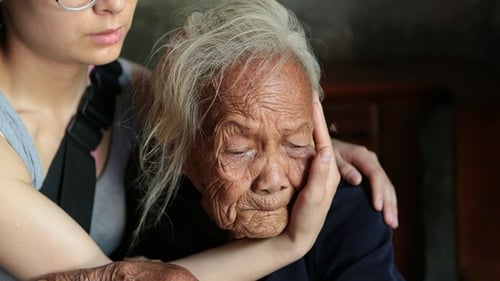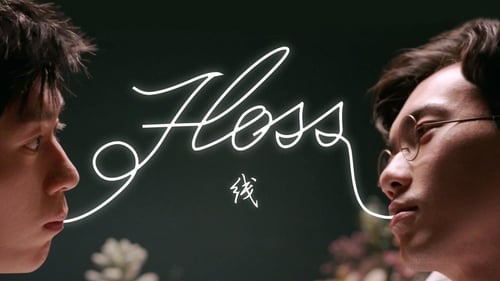傻子的村子
Género :
Tiempo de ejecución : 1H 14M
Director : Zou Xueping
Sinopsis
This is my fifth time coming back to my own village, where I was born and brought up. After I graduated from college, when I was staying in my village, I was always suspected and judged by the village people. Xizhu grandpa was called ‘fool’ by other villagers, and Zengxiang aunty was looked down by others. They come into my life, and I stayed with them. Their naïve and strange thought made think about my village in a new way. In this quite ‘normal’ village, who are normal people? In those normal people’s eyes, am I another fool of this village?

Follow the lives of the elderly survivors who were forced into sex slavery as “Comfort Women” by the Japanese during World War II. At the time of filming, only 22 of these women were still alive to tell their story. Through their own personal histories and perspectives, they tell a tale that should never be forgotten to generations unaware of the brutalization that occurred.

A policeman investigates an introverted signal-station manager suspected of raping a hotel clerk.

The relationship between two young men in Beijing becomes strained after one of them develops an unusual fetish.

A soon-to-be first-time voter, the filmmaker’s thought-provoking journey into the Rust Belt and South captures four Asian American voters’ ardent first time grassroots political participation ignited by the 2016 rise of “Chinese Americans for Trump.” FIRST VOTE is a character driven cinema verité style film chronicling the democratic participation of four Asian American voters from 2016 through the 2018 midterm elections.

"Beer! Beer!" is an "anti-romantic comedy" set in the early morning following a wild party in Berlin. When Tao, a Chinese guy, meets Sebastian, a local German. As they seem to get more and more intimate with each other, suddenly a mattress changes everything...

Here is only one chance in life, and the way of education has a profound impact on the future of children; letting children go to school at home is a challenge and an experiment that does not allow failure... This film visits four families who have completely different backgrounds but also choose to teach themselves. Through the sharing of experiences between their children and their parents, it presents the appearance of the phenomenon of self-study in Taiwan today. Is the pursuit of the happy growth of one's own children contradictory to the hope that the children will become a dragon and a phoenix? What kind of learning environment should we prepare for children? How do families with different backgrounds and children with different qualifications choose appropriate education methods? What is best for children?

The movie follows two unfortunate secret lovers who are constantly looking for a solution to their situation. Both of them are always arguing over their relationship. One day they went to a trip out of the city, into the outskirt. They hope they can solve their problems or at least escape them temporarily. They don’t have a solution, and they don’t understand why they are together. One thing that keeps them together is their love and care for each other. This is the second part of James Lee’s Love Trilogy which takes another look at unfaithfulness or rather faithlessness.


In 1994, the oil-rich city of Karamay in Northwest China was the site of a horrible fire that killed nearly 300 schoolchildren. The students were performing for state officials and were told to stand by while the officials exited first. After the fire, the story was heavily censored in the Chinese state media. To this day, the families of Karamay have not been allowed to publicly mourn their children.

La historia de una saga familiar china, contada en diferentes períodos de tiempo, comenzando por el descubrimiento de la esposa de la homosexualidad de su marido. Cuando su hija adulta viene de visita, otros secretos saldrán a la luz lentamente.

Working as a secretary for a legal office, Xiaofen records clients detailing the sordid aspects of their lives: divorce cases, medical malpractice suits, financial corruption and old-fashioned personal revenge. Xiaofen starts to question her own relationship with her boyfriend (Deng Gang), fresh out of prison and looking to get into trouble again with his gambling habit. While Xiaofen deals with the overwhelming social malaise surrounding her, rumors spread of a disaster at the local chemical plant, threatening to poison the entire city.

Yu Guangyi's stunning debut explores a grueling winter amongst loggers in Northeast China as they employ traditional practices through one last, fateful expedition. For generations, the lumberjacks of Heilongjiang, China have made their living harvesting timber amidst a barren, wintry landscape. These woodcutters confront the elements, living in makeshift cabins surrounded by snow and ice. Hand tools, sleds and horses are the only technology they employ to drag massive trees down the perilous slopes of Black Bear Valley. At constant risk of injury and death, they attempt to appease the mountain gods with ancient rituals and sacrifices. Despite their heroic efforts to subsist, the deforestation caused by their decades-long customs may lead to their ultimate demise.

The mother of a murderer awaits and prepares to meet her son. The true story of a man who killed six Shanghai policemen after suffering police beatings as a punishment for riding an unlicensed bicycle. This film was produced as a part of the Jeonju Digital Project.

Filmed over three years on China’s railways, The Iron Ministry traces the vast interiors of a country on the move: flesh and metal, clangs and squeals, light and dark, and language and gesture. Scores of rail journeys come together into one, capturing the thrills and anxieties of social and technological transformation. The Iron Ministry immerses audiences in fleeting relationships and uneasy encounters between humans and machines on what will soon be the world’s largest railway network.

A reel of propaganda film about the Red Army, shot during the Cultural Revolution, faded to red as time went by. Blue paint was smeared on the filmstrip, invaded the original red, and gave birth to this abstract dance of images.

In 1946, Heidi is entrusted to a Swiss family by her father. He will never come back for her. Today, François Yang questions his mother about her past. What follows is a journey to China, a quest to reconstruct memory. Through contact with her brothers and sister, Heidi measures the extent of the drama experienced by her family that remained in China, persecuted by the Communist Party.

A young Chinese couple struggles to adapt to their new home and grows increasingly estranged from one another and from their surroundings.

The "Great Sichuan Earthquake" took place at 14:28 on May 12, 2008. In the days after, ordinary people salvage destroyed pig farms in the mountains, collect cheap scrapped metals, or pillaging other victims' homes. Behind the media circus of official visits is an inconsolable grief of families searching for loved ones. As the Lunar New Year approaches, vagabonds and family tell of the ill-handling of rebuilding schemes and misuse relief funds. As they prepare for another visit from a high official, the refugees are swept out of the town and into tent cities. The promise to put a roof over their heads before winter seems impossible to keep.

The core of the work is to explore and experiment the viewing mechanism of the image. Try to recreate the third space with the characteristic of "halo" through images. The halo points to ambiguity and a sense of distance, while the third space is the difference space constructed by reality and consciousness. The work uses fragments of daily life and poetic non-linear narrative as two narrative means, interspersing and advancing the narrative, which corresponds to the two viewing states of the audience, namely reverie and trance, and hopes to connect the audience with the image in the form of flowing water.









